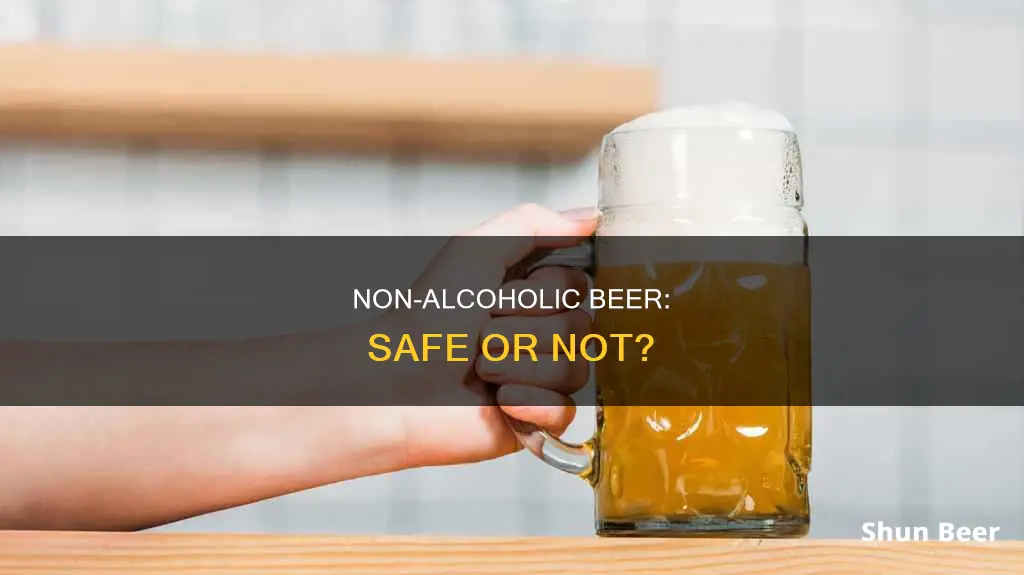
Non-alcoholic beer is often marketed as a safe alternative to alcoholic drinks, but it is important to be aware of the risks before consuming it. While non-alcoholic beer typically contains very little alcohol, some products may contain more alcohol than advertised. This can pose a risk to certain groups, such as pregnant people and those with alcohol use problems, for whom even small amounts of alcohol can be harmful.
The smell and taste of non-alcoholic beer may also trigger cravings and a subsequent relapse in people with alcohol use disorder. In addition, the carbohydrate content of non-alcoholic beer is typically higher than that of regular beer.
While non-alcoholic beer may be a suitable option for some people, it is important to consider the potential risks associated with its consumption. It is always a good idea to check the labels and be mindful of your own triggers and comfort level when deciding whether or not to consume non-alcoholic beer.
| Characteristics | Values |
|---|---|
| Alcohol content | Non-alcoholic beer usually contains very little or no alcohol. By law, non-alcoholic beers can have up to 0.5% alcohol by volume (ABV). |
| Safety | Non-alcoholic beer may be unsafe for people with alcohol use problems, pregnant people, and those with liver impairments. The smell and taste of non-alcoholic beer may trigger cravings and a subsequent relapse in people with alcohol use disorder. |
| Calories | Non-alcoholic beer tends to be lower in calories than regular beer. |
| Carbohydrates | Non-alcoholic beer usually has a higher carbohydrate content than regular beer. |
| Nutritional value | Non-alcoholic beer typically offers very little nutritional value. |
What You'll Learn

Non-alcoholic beer and pregnancy
Pregnancy is a time when expectant mothers prioritise the health and well-being of their baby, and many women seek alternatives to alcohol while still wanting to enjoy the taste of a refreshing beverage. Non-alcoholic beer has emerged as a popular option, but is it safe to consume during pregnancy?
Understanding Non-Alcoholic Beer
Non-alcoholic beer is regular beer with an alcohol-by-volume (ABV) content of less than 0.5%. There are different methods of producing non-alcoholic beer, including brewing regular beer and then removing the alcohol, or stopping the fermentation process before it reaches a higher alcohol content. If crafted properly, non-alcoholic beer can taste just like its alcoholic counterpart.
The Risks of Alcohol Consumption During Pregnancy
It is widely accepted among healthcare professionals that consuming alcohol during pregnancy can pose serious risks to both the mother and the developing baby. Alcohol can increase the chances of miscarriage, stillbirth, and premature birth. Furthermore, it is linked to a group of conditions known as Fetal Alcohol Spectrum Disorders (FASD), which can cause physical, mental, and behavioural impairments in children exposed to alcohol in the womb. Given these risks, leading organisations such as the American College of Obstetricians and Gynecologists (ACOG) and the Centers for Disease Control and Prevention (CDC) advise pregnant women to completely abstain from alcohol consumption.
The Safety of Non-Alcoholic Beer During Pregnancy
Non-alcoholic beer is often marketed as a safe alternative for pregnant women, but it is important to critically evaluate its safety. Studies have shown that beverages labelled as non-alcoholic or alcohol-free can still contain trace amounts of alcohol, sometimes even higher than what is declared on the label. This discrepancy raises concerns about the safety of non-alcoholic beer during pregnancy as a truly alcohol-free option.
The Importance of Prioritising Your Baby's Health
It is essential to prioritise the baby's health and well-being when making decisions about what to consume during pregnancy. While non-alcoholic beer may seem like a tempting alternative, it is important to remember that even trace amounts of alcohol can pose risks. To eliminate any potential risks associated with alcohol consumption during pregnancy, it is advisable to choose alcohol-free mocktails or drinks labelled as "alcohol-free" rather than non-alcoholic beer. By law, these products must contain no detectable alcohol. However, it is always recommended to carefully read the labels to ensure that the alcohol volume is 0.0%.
The Impact of Alcohol on Fetal Development
One of the primary reasons to avoid alcohol during pregnancy is its potential impact on fetal development. Unlike adults, fetuses are unable to metabolise alcohol efficiently, which means that any alcohol consumed by the mother can pass through the placenta and directly affect the baby. This can lead to a range of developmental abnormalities collectively known as fetal alcohol syndrome (FAS). Babies with FAS may experience low birth weight, vision and hearing issues, developmental delays, learning and behavioural difficulties, and a higher vulnerability to substance abuse disorders.
Exploring Alternative Beverage Options
If you're craving a non-alcoholic beer during pregnancy but want to avoid the potential risks associated with alcohol, there are plenty of alternative options available. Alcohol-free mocktails, herbal teas, infused water, and fruit juices can provide a flavorful and satisfying experience without the presence of alcohol. These options not only offer hydration but also provide essential vitamins and minerals that support a healthy pregnancy.
Considerations for Your Health as an Expectant Mother
Drinking beer during pregnancy can also have implications for the health of the expectant mother. Research suggests a link between alcohol consumption and high blood pressure during pregnancy. A study found that pregnant individuals who consumed more than 12.5 alcoholic drinks per week had a higher likelihood of experiencing pregnancy-related high blood pressure disorders, which can increase the risk of developing chronic high blood pressure later in life.
In conclusion, while non-alcoholic beer may seem like a tempting option during pregnancy, it is generally recommended to avoid it altogether. The potential risks associated with even trace amounts of alcohol make it advisable to prioritise the health and well-being of your baby by abstaining from alcohol during pregnancy.
Beer and Kidney Stones: Is Drinking Safe?
You may want to see also

Non-alcoholic beer and addiction recovery
Non-alcoholic beer has gained popularity as a viable alternative for those in recovery from alcohol addiction. However, there are differing opinions on whether consuming non-alcoholic beer is considered breaking sobriety. While it can be a helpful tool for individuals in recovery to navigate social situations, it is crucial to consider the potential risks and benefits. Here are some perspectives on non-alcoholic beer and addiction recovery:
Understanding Sobriety and Non-Alcoholic Beer
Sobriety in the context of alcohol addiction recovery refers to completely abstaining from consuming alcoholic beverages. It involves making a conscious decision to avoid the negative consequences of alcohol abuse and reclaiming control over one's life. For individuals in recovery, sobriety is a fundamental aspect of their journey towards a healthier and happier life.
Non-alcoholic beer, also known as NA beer, is designed to taste and look like traditional beer but contains minimal or no alcohol. Various brewing processes are used to reduce the alcohol content below the legal definition of an alcoholic beverage, typically 0.5% alcohol by volume (ABV) or lower. It provides an option for those who want to enjoy the taste and social experience of beer without the intoxicating effects.
The Science Behind Non-Alcoholic Beer
The production of non-alcoholic beer involves methods such as vacuum distillation or reverse osmosis to remove or reduce the alcohol content. While efforts are made to minimize alcohol, trace amounts may still remain. Labels usually indicate the specific alcohol content, but individuals in recovery should understand this distinction and make informed decisions.
Psychological Implications of Drinking Non-Alcoholic Beer
The placebo effect can play a significant role in the psychological implications of drinking non-alcoholic beer. It can trigger sensations or emotions similar to those associated with alcohol consumption, depending on the individual's mindset and intentions. For some in recovery, consuming non-alcoholic beer may trigger cravings and remind them of past drinking experiences, potentially impacting their sobriety.
Views from the Recovery Community
Sobriety coaches and recovering alcoholics have differing opinions. Some coaches advocate for complete abstinence from any beverage resembling alcohol, while others recognize non-alcoholic beer as a potential harm-reduction tool when consumed responsibly. Recovering alcoholics also hold diverse viewpoints, with some finding NA beer helpful for social inclusion, and others preferring to avoid triggers.
Making the Decision for Your Sobriety
The decision to drink non-alcoholic beer during recovery depends on individual circumstances, motivations, and triggers. Each person must evaluate their personal goals, consult professionals, and seek support from the recovery community to make an informed choice that supports long-term well-being. It is essential to know your triggers and stay away from them.
In conclusion, the question of whether non-alcoholic beer breaks sobriety is subjective. While it can provide a sense of normalcy and inclusivity, it may also trigger cravings and emotional associations for those with a history of alcohol addiction. The decision lies in the hands of each individual, based on their understanding of their recovery and personal preferences.
Breast Cancer and Beer: Is It Safe to Drink?
You may want to see also

Non-alcoholic beer and health
Non-alcoholic beer is often marketed as a healthier alternative to alcoholic beer, and for some, a way to cut down their alcohol consumption. While non-alcoholic beer typically contains very little alcohol, it is not completely alcohol-free. In the US, for example, beverages with less than 0.5% alcohol by volume (ABV) can be labelled "non-alcoholic".
The Health Benefits of Non-Alcoholic Beer
Non-alcoholic beer has fewer calories than regular beer, and some brands have fewer carbohydrates. According to a study in The Lancet, "the safest level of drinking is none". By removing alcohol, a toxic and psychoactive substance, non-alcoholic beer may reduce the risk of chronic disease.
Non-alcoholic beer has also been found to have additional health benefits. Some small studies have indicated that non-alcoholic beer may reduce inflammation and the common cold. It has also been embraced by some Olympic athletes as a sports drink, and a randomised controlled trial found that it may be an effective recovery beverage after exercise.
The Health Risks of Non-Alcoholic Beer
Non-alcoholic beer is not completely free of risks, particularly for certain groups. For example, non-alcoholic beer may be unsafe for those who are pregnant, trying to become pregnant, or have a history of alcohol misuse.
Research suggests that many non-alcoholic beers contain more alcohol than their labels indicate. One older study found that 29% of no- or low-alcohol beers tested had higher alcohol levels than stated on the label. The smell and taste of non-alcoholic beer may also be enough to trigger cravings and a subsequent relapse among those with alcohol use disorder.
Advice for Those Considering Non-Alcoholic Beer
If you are thinking of drinking non-alcoholic beer, it is important to be aware of the risks and make an informed decision. Consider your reasons for wanting to drink it, and whether the benefits outweigh the risks for your personal circumstances. Remember that non-alcoholic beer typically still contains a small amount of alcohol, so it may not be a suitable alternative for those who are pregnant or trying to become pregnant. If you are recovering from alcohol misuse, be mindful that the smell and taste of non-alcoholic beer may trigger cravings.
Drinking Beer at the Airport: Lobby Laws and Limits
You may want to see also

Non-alcoholic beer and nutrition
Non-alcoholic beer is a beer that contains little to no alcohol. It is often made by removing alcohol from regular beer, which can be done by heating the beer or using a fine filter. This process can affect the flavour, so sugar is often added to improve the taste.
Calories and Carbohydrates
Non-alcoholic beer has a similar calorie count to light beer, and both have fewer calories than regular beer. However, non-alcoholic beer has more carbohydrates and sugar than regular beer.
Vitamins and Minerals
Non-alcoholic beer contains small amounts of several vitamins and minerals, including phosphorus, magnesium, and B vitamins.
Who Should Avoid Non-Alcoholic Beer?
Non-alcoholic beer is not recommended for pregnant women, people recovering from alcoholism, or those looking to reduce their calorie intake. It may also be unsafe for people with liver damage, as it can cause higher blood alcohol levels in rare cases.
Beer Belly: Can You Drink Without Gaining Weight?
You may want to see also

Non-alcoholic beer and taste
Non-alcoholic beers have improved in taste over the years, thanks to new technologies and brewing techniques. These innovations have allowed brewers to create non-alcoholic beers that look and taste very similar to their full-strength counterparts, without the alcohol content and associated intoxication.
Previously, non-alcoholic beers were associated with a lack of flavour and were often described as "punishment". However, advancements in vacuum evaporation, filtration, and other techniques have enabled brewers to extract alcohol while largely retaining the flavour. This has resulted in non-alcoholic beers that taste like regular beer, meeting the demands of consumers who want the deep flavours of IPAs and porters without the negative effects of alcohol.
The improvements in taste are attributed to the ability to lower pressure and temperature during the brewing process, allowing alcohol to evaporate off at a lower temperature, thus preserving the innate qualities of the beer, such as complex esters and hop oils. This method is particularly effective in removing ethanol, the form of alcohol found in beer, without using excessive heat that could otherwise affect the taste.
The taste of non-alcoholic beer can also be influenced by the addition of sugars and other flavourings after the filtration process, as well as the use of modified yeasts that do not break down maltose, the main sugar in beer. Some brands have also focused on health and wellness, creating non-alcoholic beers with fewer calories than regular beer.
While non-alcoholic beers have made significant strides in taste, it's important to note that they may still contain trace amounts of alcohol. By law, non-alcoholic beers can contain up to 0.5% alcohol by volume (ABV) in some regions, and research suggests that some products may have higher alcohol levels than their labels indicate. Therefore, it is crucial to read labels carefully, especially for those with alcohol use problems or who are pregnant, as even small amounts of alcohol can pose risks.
Kayaking and Drinking Beer in Pennsylvania: What's Legal?
You may want to see also
Frequently asked questions
Non-alcoholic beer is generally safe to drink, but it's important to be aware of the risks. While non-alcoholic beer typically contains very little alcohol, some products may contain higher levels than advertised, and it's important to check labels before consuming. Additionally, for those with alcohol use problems or who are pregnant, non-alcoholic beer may not be a safe option due to the small amount of alcohol it contains and the potential for triggers and cravings.
Non-alcoholic beer is a type of beer that contains very little or no alcohol, typically produced by removing the alcohol from regular beer. The amount of alcohol in non-alcoholic beer can vary, and it's important to check labels before consuming.
One potential risk is that non-alcoholic beer may still contain some alcohol, and for certain populations, even small amounts of alcohol can be harmful. Additionally, the smell and taste of non-alcoholic beer may trigger cravings and a subsequent relapse for those with alcohol use disorder.
Non-alcoholic beer may not be a safe option for those with alcohol use problems, as it may trigger cravings and a relapse. It is also not recommended for pregnant individuals, as there is no known safe amount of alcohol use during pregnancy.
Non-alcoholic beer can be a good alternative for those looking to reduce their alcohol intake or maintain sobriety. It often has fewer calories than regular beer and can be a healthier option. Some studies also suggest that non-alcoholic beer may have anti-inflammatory effects and reduce the risk of certain diseases.







